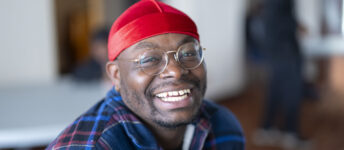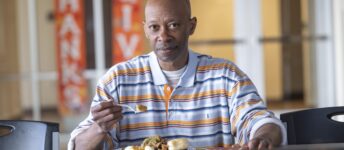Elizabeth
Elizabeth practiced criminal law for 23 years. She married and had four sons, but her husband was abusive, so she divorced him. She defended the worst of criminals to support her children. After her ex took three of their four sons and their home, she had a nervous breakdown. Her father, “who had a very deep faith,” had died a few years earlier, leaving her without “one of my best friends.” She tried going to church, but “I never prayed other than to thank God for my successes.”
Though she continued to try cases, her rent was high and she got evicted and stopped practicing law. What followed was 10 years of homelessness in and out of hotels. When doctors found a tumor on her pancreas, she was laid up for a year. “I didn’t want to die, but I didn’t really care either.” She got married again, to a former client, a drug addict. When she was disbarred for complaints against her, she drank to cope and dull the pain.
Elizabeth asked her husband to quit drugs, but he left her for a girl he met in rehab. “I was heartbroken for two lonely years.” When her husband went to jail, she had an affair, but then got dumped by the new guy. When he was released, he convinced her to move with him to Virginia. She got a job as a paralegal, but was fired when they found out she was a disbarred attorney. Not much later, she was diagnosed with degenerative disc disease and was prescribed drugs for the pain. “He was an addict and I was taking opiates. We decided to end it. I found an article describing why people commit suicide: family estrangement, fear of prosecution, loss of prestige, loss of job, no income, homelessness, depression, health problems. “We had that in spades, and I thought this would be a step of faith—go and join God and the angels, see my father again.” They tried and tried with heroin and alcohol, but every attempt failed.
When her husband came to the Mission’s Men Shelter, the Women’s Shelter was full. With suicidal thoughts, Elizabeth checked into a psychiatric hospital. When she got out, a bed had opened for her, but she relapsed on opiates, overdosed, and had to leave. “I don’t know why I made that bad decision. I was embarrassed and mortified. I felt like I had failed in every area of my life including being homeless, if that’s possible.”
They moved into a rented a room, but the homeowners were “vicious alcoholic hoarders.” Still, they lived in that toxic environment for five years. “I thought I wasn’t good enough to get the relationship with God that everyone else gets.”
When her husband was arrested for selling drugs, “for two months, I laid in bed, smoked cigarettes, drank alcohol, watched TV, and felt sorry for myself. Then I called the Mission and apologized for what I put them through. I was stunned that they took me back.” The staff helped her apply for disability and set up doctor’s appointments, including one for depression. Her husband is still in jail, but is studying the Bible with her, the same passages she is studying at the Mission.
“The staff are always willing to pray with you. It’s like they have a laser beam to God. They’ve helped me tremendously, reminding me what my priorities should be, and to grow in my faith. I have hope and happiness again—no, not happiness. Joy! There’s a difference. It’s internal joy and it’s reconnected me back to God. I can’t believe I ever left Him, but He never left me.”
Elizabeth is looking forward “to being a person again”, back in the world, whole and helpful. “My goal is to get a job, save money and move out on my own. Meanwhile, I feel so privileged and grateful to be here.”
~ Linda Jones with Cheryl Little for The Union Mission



